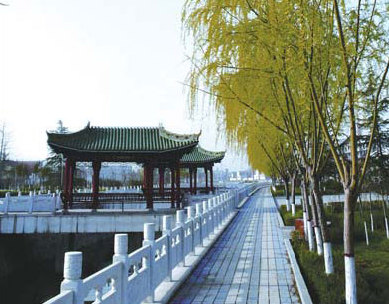Henan Special: Farmers find better life in newly built planned communities
Updated: 2013-05-16 08:06
By Shi Baoyin (China Daily)
|
||||||||
|
Binhai Park offers a good environment for locals. Liu Fang / for China Daily |
In the large, comfortable sitting room of her new home in the Wanghu community of Zhicheng township in the northwestern part of Henan province, Cheng Xiuling enjoys TV programs in front of a new 49-inch LED TV set with her husband and son.
After living in the community for nearly nine months, she said she still can hardly believe her new life is real.
"I never dreamed that farmers like us could one day live the same life as urban citizens," she said.
Cheng's family and 400 households of former local farmers relocated to this new community recently as a part of a drive to urbanize Jiyuan, a city where the township is located.
In addition to basic infrastructure, such as water supply and heating and gas networks, there are also other facilities, including a cultural activity center, healthcare clinics and an apartment for the elderly.
Wanghu is one of four newly planned residential communities in Jiyuan.
With a total investment of 350 million yuan ($56.9 million), the four communities are altogether capable of housing 5,000 residents.
In the development of the new urban communities, around 30 hectares of land will be set aside for industrial use.
As one of the pilot cities in Henan province for integrated development of urban and suburban regions, Jiyuan has invested more than 1 billion yuan since 2005 to transform its villages in the countryside.
More than 50 modernized communities in three townships have been planned, which will integrate 528 villages in the city's suburban area and provide them with upgraded infrastructure and services.
When all are completed in 2030, nearly 80 square kilometers of land will be saved as a result of high-density urban planning.
Thirteen of them will be completed by 2015, and together they will house some 90,000 residents, according to the short-term plan.
The newly built communities will be equipped with service centers, police stations, clinics, libraries, outdoor sports equipment, kindergartens and shopping facilities so that the residents do not have to leave to receive convenient and high-quality services, said local government officials.
The water supply system, sewage treatment facilities and the transportation, electricity and gas networks of the new districts are integrated with those of the urban areas.
The city is actually the first one in the province in which all townships are linked by highways and all villages have access to running water, telephone and the Internet.
The residents also have a better social security system that includes healthcare and endowment insurance.
In addition to the housing program and public services, the local government also plans to introduce new industries to provide jobs.
Authorities are working to attract investment, and their focus is the labor-intensive companies, which can absorb unskilled or semi-skilled former farm workers.
There will be traditional manufacturing and chemical enterprises as well as companies in emerging fields, such as logistics, hospitality, tourism and cultural sectors.
Agricultural industries will be the main focus, such as vegetable and tobacco processing, and livestock breeding. A number of industrial zones have been planned, three of which will create a total of more than 50,000 jobs.
The arrival of Taiwan-based Foxconn, a subcontractor that produces Apple products and other electronics, is expected to produce some 38,000 additional positions in the near future.
Farmhouse tourism is another featured industry.
More than 120 farmhouse bed and breakfasts have opened. Some old buildings with traditional architecture will be preserved and restored to make tourist attractions.
The environment and public services have also been improved, especially in remote areas.
The city has won the Award for Chinese Model City for Living Environment, and was nominated for other honors, including Sanitation City of China, Garden City of China and National Civilized City.
In the next phase of its strategy, the city government will reform the current land and property management systems and improve the fiscal and taxation administration to make them more flexible.
It will also issue innovative policies to encourage the establishment of petty loan agencies as well as village and township banks.
shibaoyin@chinadaily.com.cn

 Michelle lays roses at site along Berlin Wall
Michelle lays roses at site along Berlin Wall
 Historic space lecture in Tiangong-1 commences
Historic space lecture in Tiangong-1 commences
 'Sopranos' Star James Gandolfini dead at 51
'Sopranos' Star James Gandolfini dead at 51
 UN: Number of refugees hits 18-year high
UN: Number of refugees hits 18-year high
 Slide: Jet exercises from aircraft carrier
Slide: Jet exercises from aircraft carrier
 Talks establish fishery hotline
Talks establish fishery hotline
 Foreign buyers eye Chinese drones
Foreign buyers eye Chinese drones
 UN chief hails China's peacekeepers
UN chief hails China's peacekeepers
Most Viewed
Editor's Picks

|

|

|

|

|

|
Today's Top News
Shenzhou X astronaut gives lecture today
US told to reassess duties on Chinese paper
Chinese seek greater share of satellite market
Russia rejects Obama's nuke cut proposal
US immigration bill sees Senate breakthrough
Brazilian cities revoke fare hikes
Moody's warns on China's local govt debt
Air quality in major cities drops in May
US Weekly

|

|








